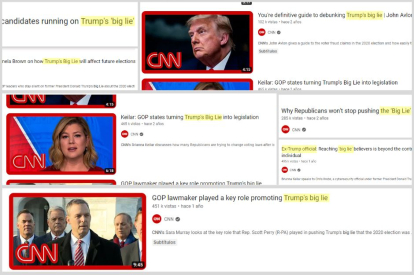Judge rules CNN's remarks about Trump "odious and repugnant" but not illegal
The former Republican president had accused the network of comparing him to Adolf Hitler during its coverage of the 2020 election.

(Cordon Press)
"CNN’s statements while repugnant, were not, as a matter of law, defamatory." So concluded Magistrate Judge Raag Singhal's ruling in Donald Trump's defamation lawsuit against CNN for its coverage of the 2020 election. "The case will, therefore, be dismissed with prejudice."
Trump had accused the network of defamation for comparing him to Nazi dictator Adolf Hitler. Key among the evidence presented was the phrase "the big lie," originally attributed to Hitler, which CNN repeatedly used to refer to the former president's remarks about the legitimacy of the 2020 presidential elections.

The phrase 'The Big Lie' was central to Trump's accusation against CNN for comparing him to Hitler. Although the lawsuit included only five examples, the network used the formula numerous times (pictured).
The phrase "The Big Lie" was central to Trump's indictment of CNN for comparing him to Hitler. Although the lawsuit included only five examples, the network used the formula numerous times (pictured). (Voz Media)
After analyzing the examples presented by the former president's lawyers, Judge Singhal held that CNN's statements should be considered opinions, not verifiable facts. And, therefore, "not actionable."
He also dedicated a few lines to criticize the current media system:
While the judge did not deny or claim to distinguish the "political motivation" of undermining Trump, he did explain that the legal team of the GOP nominee needed to prove that CNN intended to inflict harm on the former president using information they knew to be false or that they had not bothered to check, something typified as "malice."
"The Court finds Nazi references in the political discourse (made by whichever “side”) to be odious and repugnant," Singhal opined, "but bad rhetoric is not defamation when it does not include false statements of fact."
In that sense, no reasonable member of the audience could or should infer that the Republican "advocates the persecution and genocide of Jews or any other group of people." And even if it could be interpreted in such a way:
Trump vs CNN by Santiago Adolfo Ospital on Scribd












